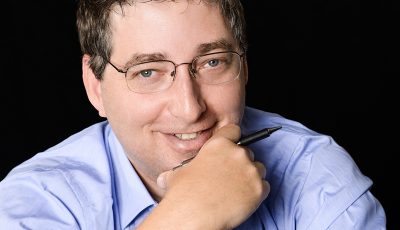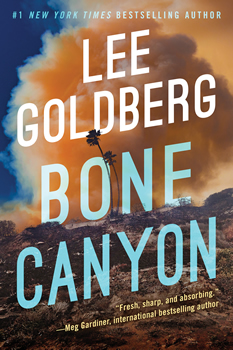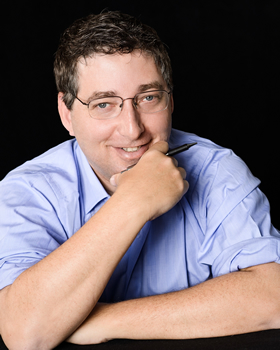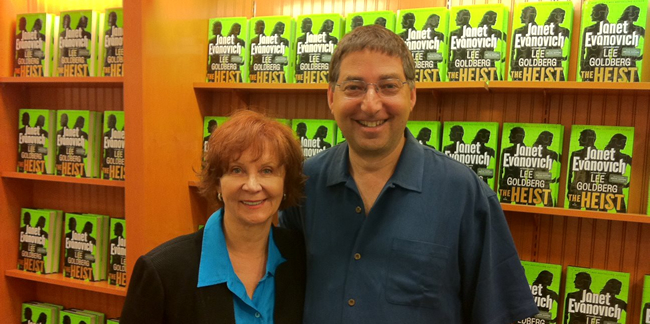

Up Close: Lee Goldberg
Wildfires Scorch LA Canyons to Reveal…A Novel Plot
 By Josie Brown
By Josie Brown
In BONE CANYON—Lee Goldberg’s second book in his Eve Ronin series—charred bones found in the aftermath of a devastating Santa Monica Mountains fire embroil his protagonist in a conspiracy that puts her hard-fought position in the Los Angeles Sheriff’s Department in jeopardy—not to mention her life.
Goldberg is no stranger to the whims of Mother Nature. If the past few years have proven anything, it’s that scorching wind fires are now a way of life in his stomping ground: sunny Southern California.
“Fire was licking our back fence,” he says. “When we evacuated from our house, I was proofing the galley of Lost Hills (the first book in the series).”
The plot for BONE CANYON came to Goldberg while reading a small item in the online neighborhood newspaper The Acorn. “After the fire, all the dense growth was burned from the hillsides.”
Apparently, bodies had been tossed in the canyons, where they deteriorated while entangled in scrub brush that dots the otherwise barren canyon walls. They stayed there for years, unnoticed until the fire stripped away the vegetation. At that point, the bones tumbled down into the canyons.
“After the evacuation, people came back to their homes and found bones in their backyards,” Goldberg says. “The police looked into it. In many cases, it turned out to be gang members murdered by rival gangs.”
Other deaths were accidents, he adds. “One couple was on their way back from LAX after a flight. They’d never made it home. Their car was found at the bottom of a ravine with their bodies in it. And years ago, a woman with Alzheimer’s wandered away from her home—her bones were found in another canyon. Even plane wreckage was found there. They didn’t know if the wreck was left from a movie shoot or an actual crash. It was amazing, all the secrets that were revealed by the fire. It was irresistible to me.”
And as far as Goldberg is concerned, his LA neighborhood was the ideal locale for this novel series. “When I start to write a police procedural, I ask myself, ‘How can I show Los Angeles in a way that hasn’t been done to death?’ Because Raymond Chandler and Joseph Wambaugh and Robert Crais and Michael Connelly have walked these streets, what can I do differently? I found a corner of Los Angeles that hasn’t been written about. And the Los Angeles County Sheriff’s Department hasn’t really been written about either. Everything that is in LA is in the Lost Hills jurisdiction: movie production, the hippy-dippy lifestyle, the insanely rich, the rural. Which is what makes it so fascinating to me. I had a fresh canvas.”
Goldberg’s research meant a deep dive into forensic anthropology. “I interviewed, I read a lot of books on it, and then I pushed all that away. There is a tendency among authors who do research to show off; to write in all sorts of boring exposition and details to prove, ‘Hey, I did the research.’”
Goldberg has a different agenda. “I’m just looking for the one cool fact, the one tasty detail, that one colorful observation from reality that makes it real. The rest becomes the stuff that informs my dialogue or descriptions. I don’t want to hit the reader over the head. I just want it to come out naturally.” Instead, he lists his source notes at the end of his books.
In Goldberg’s mind, Eve is the reader. “She admits she doesn’t know this stuff, which is really unusual for a cop. She’ll say to the experts: ‘I honestly don’t know what you just said.’ Other cops will say, ‘Yeah, I got you…’ when, really, they have no clue. They don’t want to seem weak or uninformed.”
In Book One (no spoilers here), Eve’s career within the Los Angeles Sheriff’s Department was propelled by a media stunt: a video of her face-planting a Hollywood star who was beating his girlfriend went viral. Although off-duty, Eve wrestled him to the ground. She leveraged that popularity into a promotion with the homicide squad. Her peers and superiors feel she didn’t deserve it, but at the time, the sheriff’s department was facing all kinds of scandals and needed some good news.
Although Eve has since proven herself to stay on the squad, she has come to realize that such notoriety is a double-edged sword. Her bosses are still leery that she’s a publicity hound. At the same time, they know the comely blond female detective is great eye candy—which is why they don’t hesitate to place her beside them in press conferences.
“Many of Eve’s critics are absolutely right about the mercenary way in which she’s using the media to her advantage. But she won’t even admit that to herself,” Goldberg says. “She thinks she’s not savvy of politics and the media, when in fact, she’s leveraged it. One thing that draws me to her character is that she’s not perfect. Eve doesn’t have a clear understanding of herself. She doesn’t even have a clear understanding of her own job. She has an innate skill but hasn’t quite mastered how to use it. That makes the character, I think, more interesting to me as a writer—and, hopefully, more interesting for the reader.”
Having a young protagonist who is not really deserving of her job gives her depth, Goldberg feels. “I didn’t want a self-confident hero, proven but misunderstood by his superiors. I’m so tired of that cliché. I want a character who isn’t a deductive genius, a brilliant criminalist, who has a natural talent but hasn’t really marshaled it yet. So Eve makes some huge mistakes along the way. And learns from those mistakes. It makes the character interesting to me.”
Having to prove herself to others and to herself makes for interesting conflict. “It makes it easier to come up with stories, and it’s much more engaging to write,” Goldberg says. “It also gives me a lot more ground to cover if I’m lucky to have future novels.”
In fact, a third Eve Ronin novel is already on the way. Readers should be on the lookout for Gated Prey in November of 2021.
Goldberg has given Eve plenty of unresolved issues to carry the series far beyond Book Three. Her mother, an aged-out wannabe actress, now lives vicariously through her daughter’s fame. Her deadbeat dad, a producer who hasn’t had a hit movie in years, wants to cash in on Eve’s notoriety by building a TV show around her life.
Goldberg has loosely based Eve’s parents on his own. “My mother was a journalist, feature writer, and gossip columnist for newspapers in the San Francisco Bay Area, and then the Palm Beach Desert Sun. She was always jealous of my career and my brother’s career. She couldn’t understand why she wasn’t on the New York Times bestseller list. When I was writing and producing TV shows, she wondered why I didn’t give her a script. She didn’t get it.”
Goldberg’s father was an anchorman on KPIX in San Francisco. “I saw him every night on the 11 o’clock news.” But fame is fleeting. “As he got older, he made some bad choices—and he wasn’t a celebrity anymore. He still carried himself like one, though. He always talked as if he were on camera.”
He points out that, in crime novels, it’s rare for the protagonist to have a family. “If so, they’re contrived. They have ridiculous situations. You know, ‘My brother was a serial killer.’ Or ‘I have my daughter because my ex-wife was murdered by a crossdressing serial killer-psychic.’ Whatever. All this really over-the-top stuff. I wanted to ground Eve in recognizable domesticity. Her brother cleans pools and married young. Her sister is a nurse. Her mother is very much in her life, and it’s a loving but also tense relationship. Her father is on the periphery of her life. It’s a life that readers can relate to. Maybe they can’t relate to her as a cop, but they can relate to her domestic situation. With what it was like to live with her mother. I think that humanizes her and makes readers invested in the story.”
Like Goldberg, the fact that Eve is the eldest sibling in a broken home drives her even harder to excel at her job. “She’s looking for control in an uncontrollable world with too much uncontrollable chaos. It’s why she became a cop. She’s trying to maintain the order in her life that she couldn’t maintain in the tumultuous years in which she was growing up.”
In contrast, Eve’s brother and sister have found peace with their parents’ shortcomings and beg her to do the same. They also agree with their parents that Eve should cash in on her notoriety since her latest case reveals how despised she is with many of her fellow law enforcement officers—and for a good reason: the murders she’s uncovered may incriminate a few of their own.
Is it the norm for cops to want to see a show based on them?
Goldberg thinks not. “LA is a media city. It’s where dreams are made. We live in this fantasy land and all of Los Angeles is a Hollywood backlot. There are so few streets that haven’t appeared in cop shows and movies.”
It seems that everyone in LA is, in some way, connected to the entertainment industry. “It’s a company town, so it’s inevitable,” Goldberg points out. “It’s the same as if you lived in Washington State. Everyone would be connected to the logging industry. If you were in Detroit, you’d be connected to the auto industry. It’s just the way it is. Here, we have to deal with that reality.”
Eve is aware of this too. “But having her confront the media version of herself with who she has to be and what she’s striving for is conflicting for her,” Goldberg says.
He has paired Eve with a sidekick who’s more than the cliché cop partner. Interestingly enough, he hadn’t planned for Duncan Pavone to be in Book Three, but the response he’s gotten from readers and critics to the character has convinced him to keep Duncan in her life. “It’s funny because, on paper, the character comes across as an instant cliché,” Goldberg says. “Even Duncan knows this. Or, as he puts it: ‘I’m the fat old detective on his way out, about to retire. I am definitely going to get shot.’”
Although Goldberg can’t resist playing Duncan for laughs, he also writes against this trope whenever he can. “He knows what he’s doing. Duncan is self-effacing. There’s a reason he’s been in this job as long as he has. With gentle humor, he’s able to make his points to Eve without using a sledgehammer.”
Duncan also offers sage advice to his rookie partner: “He’s able to balance a personal life with a professional one. He sees both sides. He works as hard at keeping his marriage as he does in working his cases. Or, as Duncan puts it: ‘I’ve been married for thirty years. I have two kids. They don’t hate me. My wife loves me. And that’s my greatest accomplishment—not what I’ve done on the police force.’”
Another strength in Goldberg’s characters: even the bad guys have a chance at redemption.
Goldberg says Stephen J. Cannell (Rockford Files, The A-Team, and numerous novels) gave him the best advice for writing villains. “They don’t wake up in the morning and say, ‘I want to be evil.’ They have the same desires that we do. They want to be loved. They want their kids to have a better life than they do. They worry about the mortgage. They go to the bathroom. They think they’re good people who must provide for themselves and their families. Their businesses just happen to be violence or crime.”
And villains must always have something going on. “They aren’t just about the one crime that the hero is investigating. They have lives and commitments and responsibilities outside whatever the case the hero is investigating.”
Goldberg insists that this rule also goes for supporting characters. “What are they doing? What are their goals? What are their lives? What are they about? Even the characters that Eve doesn’t like are the heroes of their own story. They can be good, and they can be bad. They can do really terrible things, but they can also do wonderful things. They aren’t black and white characters. We all have things about ourselves that aren’t wonderful. We all do dumb things. We do selfish things.”
Even Eve isn’t spared from faults, mistakes, or ego. “She comes across to a lot of people as an abrasive pain-in-the-ass self-centered attention hog. To some degree, she is—even if she doesn’t recognize it. I think that makes for a more interesting character. I don’t like books in which the author idealizes their protagonist. I think that makes them dull.”
At the same time, Goldberg points out, he loves Lee Child’s Jack Reacher series. “There is a pleasure in a perfect hero, one who is never overwhelmed by anything.” But, in general, Goldberg stays away from that. “I like to have characters who have vulnerabilities.”
There is a love interest for Eve: forensic anthropologist Daniel Brooks. Whereas the reader may see Indiana Jones and all that implies, Goldberg insists, “In my mind, I saw Richard Dreyfuss from Goodbye Girl or from Jaws. Sort of smart, but lovable and goofy. Obviously smart, but self-effacing. Pudgy and lovable, but not movie-star handsome. We haven’t seen those kinds of characters in books or films lately.”
In fact, Lost Hills has been optioned for television. As such, the producers may have a different idea of what he, and Eve, should look like. (Fair warning, Mr. Goldberg: a hunk.)
The third Eve Ronin novel, Gated Prey, is due out next fall—as is the television show.
Goldberg laughs at the timing. “It could be really weird. I could be writing the books when there is a fictional Eve out there on TV. Of course, I’d incorporate that into my narrative. It’s impossible to separate the two.”
Still, Goldberg insists on a hands-off approach to the adaptation. He knows firsthand that the odds of an option going to pilot and then on to a network time slot are a long shot. “I’m pretending it doesn’t exist. If it happens, I’ll be thrilled. If it doesn’t happen, I won’t be surprised.”
Experience is the best teacher. Goldberg started writing novels while he was in college. He found a publisher for his first series, Vigilante. Four books were published, but then the publisher went bankrupt.
Since then, Goldberg made a successful detour into television writing and producing. His credits include Diagnosis Murder, Monk, and Mystery 101, currently airing on the Hallmark Channel.
Straddling both industries has meant a life of ups and downs. One tenet stays with Goldberg: “Writers write.”
To his mind, it doesn’t mean just writing fiction. “I know too many authors that, if they don’t get another book contract, they’re done. They haven’t thought about a back-up plan.”
Goldberg suggests that writers expand their options. “If you write for a living, you always have to be thinking, ‘Where’s my next check coming from?’ So I also write nonfiction. I write short stories. I write scripts. Because I want to have a career that sustains my family and me. There are times when television is where most of my revenue is coming from and where my attention is spent. And there are times most of my income comes from books, and TV takes a back seat. But I always have the two worlds. Plus, I still write short stories. And I have two publishing companies (Brash Books and Cutting Edge Books). I make sure I have a lot going on so that I always have cash flow. I want to keep myself engaged and always have something going.”
The way Goldberg sees it, writers have one significant advantage: “Storytelling is never going to be extinct. Even in a recession, people want to read. You’ve always got a job. All you need is a blank sheet of paper. You don’t need to be hired by anyone. You can just start writing,”
Goldberg lives what he preaches. “I’m not happy if I’m not writing. I need it for my psychological and emotional well-being. I need to be writing.”
And yet, he doesn’t know what he will be writing next. “For the first time in my life—in my professional adult life—I don’t know what I’m doing next. I don’t have a contract for another book. I don’t have a contract for another script. I have no obligations at the moment.”
Goldberg has no qualms joking about it. “What am I going to do next? What’s my next book? I seem secure while talking to you, but I’m riven with insecurities—that I’m a fraud, I’ve finally run out of ideas, I’ve finally been revealed as to what I am—a useless hack. I hope they’re taking job applications at Arby’s and that a free sandwich comes with the deal.”
So, yeah, there’s hope for him yet. If the Eve Ronin series is any indication, Lee Goldberg will have no trouble finding a topic that will engage readers and keep him smiling.
*****
Josie Brown just released the twentieth novel in her Housewife Assassin series, Assassination Vacation Planner. Check her out on her website. There you’ll also find links to her Author Provocateur podcast, including her audio conversation of this interview.
- Up Close: Jane Smiley - November 30, 2022
- Up Close: Lisa Barr - February 28, 2022
- Up Close: Kaira Rouda - December 31, 2021



